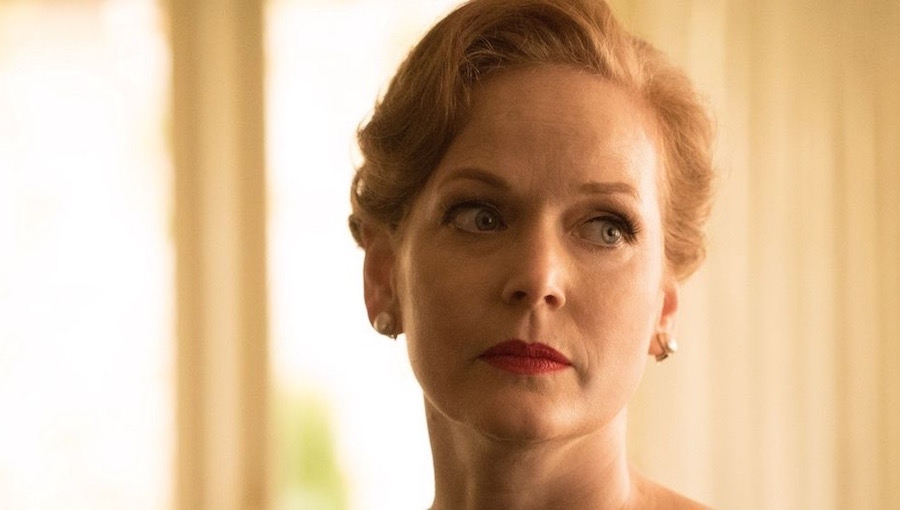Episode 7 is a visual masterpiece. Opening with Frank’s (Rupert Evans) nightmare, the episode illustrates the desperation one faces in protecting family. This applies to both Frank, whose nightmare recalls his involvement in the deaths of his sister and her children, and Smith (Rufus Sewell), who has chosen to protect his son over allegiance to his party. The dinner table gassing of Frank’s nightmare uses an overhead perspective as if the audience were the gas, suggesting the audience is complicit in such tragedies. Throughout this season, all alternate versions of reality—the content of the film, Frank’s nightmare, Joe’s (Luke Kleintank) drug trip, and Tagomi’s (Cary-Hiroyuki Tagawa) visits alternate America—serve as powerful stimuli for characters. These scenes are also visually dynamic and emotionally charged.
Continuing the trend of powerful, well-edited scenes, there is a beautiful montage of Smith and Helen (Chelah Horsdal) as they both cope with their bottled-up feelings of desperation and grief over Thomas’s (Quinn Lord) condition. Visually positioning his priorities, on Smith’s desk sits two framed photos of his family in front of a framed photo of him with the Führer. The camera angles of the Smith’s face’s, Helen’s fire engine (or Nazi) red lipstick, and a close up on Smith smoking, with resounding music in the background, create an emotionally intense scene that needs no dialogue to get across the bottled up, internal struggles the couple is facing. Clearly, Smith, whose ruthlessness as a Nazi previously made him seem heartless, has realized that he cares more about protecting his son than adhering to Nazi codes. His speech at Jerry Adler’s funeral (ironic since Smith is the one who murdered him) vocalizes the importance of family: “Man is only ever as strong as the people around him…whatever strength he has, he draws from them, and for them, he must be prepared to give everything, his life for his blood, or else, or else everything he has done has been for nothing; he is nothing.” Clearly speaking from within and about his own personal sentiments, Smith opens himself up and exposes a raw, torn heart. Sewell’s emotion in this scene and his delivery of the speech are absolutely touching.
Visually, the funeral scene is striking. The funeral roses in the shape of a bright red swastika pop on the screen. The church lacks religious iconography and, instead, its religion is political. In place of a cross at the alter hangs a large portrait of Hitler, and the stained glass window in the back of the church illuminates a large red swastika. Visually stunning and ominous, the funeral scene shows how a tradition remains even though the religion has been eradicated. A prayer ends with a collective “heil Hitler” rather than “amen,” and the attendees sing a hymn about comrades and battles to the accompaniment of a church organ. These are the scenes that the show should show more of—glimpses into the everyday practices of this version of reality. They remind the audience how easily this alternate world has normalized Nazi practices and ideology. The audience may be intimidated by this reality, especially knowing the cost of such a way of living. But characters like Thomas, who is so innocent, serve as reminders that in being born into a world where the Reich rules, one does not know any better. Thomas is helplessly ignorant of the evils of the Nazis, and instead, looks up to them and to his father. The tragic irony is that Thomas is likely to be executed by the party that he admires, as the pomp and circumstance of the Nazis are still rooted in discriminatory practices.

